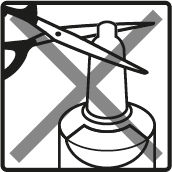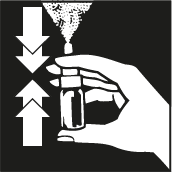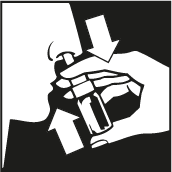Otrivin Junior Nasal Spray contains the active ingredient Xylometazoline hydrochloride. Otrivin Junior Nasal Spray is a nasal decongestant. It quickly relieves your child’s
stuffy nose and helps clear nasal passages by reducing excessive nasal secretions
in your child. It is indicated in children 6-11 years old.
Otrivin Junior Nasal Spray is used for the relief of blocked nose caused by colds,
flu, sinusitis, hay fever or other allergic rhinitis.
2. What should I know before I use Otrivin Junior Nasal Spray?
Warnings
Do not use Otrivin Junior Nasal Spray:
in children below 6 years of age.
if your child is allergic to xylometazoline or any other ingredients of this medicine.
Always check the ingredients to make sure your child can use this medicine.
if your child has had the pituitary gland removed by operation through the nose.
if your child has undergone recent trans-nasal surgery (brain surgery where the operation
was carried out through the nose or mouth).
if your child has narrow angle glaucoma (increased pressure in eyes).
if your child has chronic nasal inflammation with very dry nasal passages (rhinitis
sicca or atrophic rhinitis).
Tell your doctor or pharmacist if any of the above apply because Otrivin Junior Nasal
Spray is not suitable for your child in these circumstances.
Frequent or prolonged use may cause nasal congestion to recur or worsen.
Otrivin Junior Nasal Spray is for nasal use only and contains benzalkonium chloride
as a preservative.
Brief stinging sensation or sneezing may occur. Excessive use may damage lining of
nose.
Check with your doctor or pharmacist if your child:
has any other medical conditions [high blood pressure; heart disease (e.g. long QT
syndrome); an overactive thyroid gland (hyperthyroidism); diabetes; difficulty in
urinating and/or an enlarged prostate gland (prostatic hypertrophy); a tendency to
have nose bleeds; has a rare tumour of the adrenal gland that produces high amounts
of adrenaline and noradrenaline (phaeochromocytoma)].
takes any medicines for any other condition.
During treatment, your child may be at risk of developing certain side effects. It
is important you understand these risks and how to monitor for them. See additional
information under Section 6. Are there any side effects?
Pregnancy and breastfeeding
Check with your doctor or pharmacist if your child is pregnant or intend to become
pregnant. Do not use Otrivin Junior Nasal Spray if your child is pregnant.
Talk to your doctor or pharmacist if your child is breastfeeding or intends to breastfeed.
Otrivin Junior Nasal Spray should only be used if recommended by your doctor.
Children and adolescents
Do not use Otrivin Junior Nasal Spray in children below 6 years of age. Otrivin Adult
Nasal Spray is available for adolescents and children aged 12 years and over.
3. What if I am taking other medicines?
Tell your doctor or pharmacist if your child is taking any other medicines, including
any medicines, vitamins or supplements that you buy without a prescription from your
pharmacy, supermarket or health food shop.
Some medicines may interfere with Otrivin Junior Nasal Spray and affect how it works.
It is particularly important to mention to your doctor or pharmacist if your child
is taking or has taken the following medicines:
- Monoamine oxidase (MAO) inhibitors (used for treatment of depression): Otrivin Junior
Nasal Spray is not recommended if your child is taking or has taken these medicines
within the last 14 days. Use with Otrivin Junior Nasal Spray may substantially increase
blood pressure.
- Tri-cyclic and tetra-cyclic antidepressants: use with Otrivin Junior Nasal Spray
may increase the effects of xylometazoline (the main ingredient in Otrivin Junior
Nasal Spray).
If your child uses any of the above-mentioned medicines, consult a doctor before using
Otrivin Junior Nasal Spray.
Check with your doctor or pharmacist if you are not sure about what medicines, vitamins
or supplements your child is taking and if these affect Otrivin Junior Nasal Spray.
4. How do I use Otrivin Junior Nasal Spray?
How much to use
Always use Otrivin Junior Nasal Spray exactly as recommended below. You should check
with your doctor or pharmacist if you are not sure.
With supervision. 2 sprays into each nostril up to 3 times daily as needed. Do not
exceed 3 applications daily in each nostril. Do not use more often than every 8-10
hours.
Follow the instructions provided with the medicine.
Do not exceed the recommended dosage, especially in children and the elderly.
If your child forgets to take Otrivin Junior Nasal Spray do not take a double dose
to make up for the forgotten one.
When to use Otrivin Junior Nasal Spray
Otrivin Junior Nasal Spray should be used when necessary. Do not exceed 3 applications
daily in each nostril. Do not use more often than every 8-10 hours.
How to use Otrivin Junior Nasal Spray
1. Do not cut the nozzle. The metered dose spray is ready to prime before use.

2. Gently clear your child's nose.
3. Remove protective cap.
4. Before using for the first time, prime the pump by actuating 4 times. If the product
has not been used for longer than 7 days, the pump will need to be re- primed with
2 actuations. If the full spray is not administered, the dose should not be repeated.
Be very careful not to spray in the eyes or mouth.
5. Hold bottle upright with thumb under base and nozzle between two fingers

6. Lean your child's head forward slightly and insert the nozzle into the nostril.
7. Spray and ask the child to breathe in gently through the nose at the same time.

8. Repeat with the other nostril.
9. Clean and dry the nozzle before replacing back the cap right after use.
10. To avoid possible spread of infection, the spray should only be used by one person.
If you use too much Otrivin Junior Nasal Spray
If you think that your child has used too much Otrivin Junior Nasal Spray, or in case
of accidental ingestion, you may need urgent medical attention.
Signs of an overdose may include severe dizziness, sweating, severely lowered body
temperature, headache, slow heartbeat, rapid heartbeat, impaired breathing, coma,
convulsion, hypertension (high blood pressure) which may be followed by hypotension
(low blood pressure).
You should immediately:
phone the Poisons Information Centre
(telephone: Australia 13 11 26; New Zealand 0800 764 766), or
contact your doctor, or
go to the Emergency Department at your nearest hospital.
You should do this even if there are no signs of discomfort or poisoning.
5. What should I know while using Otrivin Junior Nasal Spray?
Things you should do
If congestion persists, seek medical advice.
Each pack should be used by only one person, for reasons of hygiene.
If irritation occurs or your child has signs of allergy, discontinue use.
If you accidently spray into your child’s eyes, rinse the eyes thoroughly with running
water and contact your doctor immediately for advice as to what treatment is needed.
Your child may experience temporary blurring of vision, irritation of the eye, painful
or red eyes. Worsening of narrow-angle glaucoma may also occur.
Remind any doctor, dentist or pharmacist you visit that your child is using Otrivin
Junior Nasal Spray.
Things you should not do
Otrivin Junior Nasal Spray is not intended for use in the eyes or mouth.
Do not use in or around the eyes.
Do not use for more than 3 days at a time unless advised by a doctor or pharmacist.
If congestion persists, seek medical advice.
Product tampering
Otrivin Junior Nasal Spray is enclosed in a tamper- evident carton to help protect
you from product tampering. If you find that the carton seals have been broken or
are missing, do not use the product and return it to the place of purchase.
Driving or using machines
Be careful before your child drives or use any machines or tools until you know how
Otrivin Junior Nasal Spray affects you.
Otrivin Junior Nasal Spray has no or negligible influence on the ability to drive
and use machines.
Drinking alcohol
Tell your doctor or pharmacist if your child drinks alcohol.
Looking after your medicine
Store below 30°C.
Keep out of reach and sight of children.
Do not use Otrivin Junior Nasal Spray after the expiry date which is stated on the
outer pack and on the immediate container. The expiry date refers to the last day
of that month.
Store in the original package.
Follow the instructions in the carton on how to take care of your medicine properly.
Store it in a cool dry place away from moisture, heat or sunlight; for example, do
not store it:
in the bathroom or near a sink, or
in the car or on window sills.
Keep it where young children cannot reach it.
Getting rid of any unwanted medicine
If you no longer need to use this medicine or it is out of date, take it to any pharmacy
for safe disposal. Do not throw away your medicine in your household waste.
Do not use this medicine after the expiry date.
6. Are there any side effects?
All medicines can have side effects. If your child does experience any side effects,
most of them are minor and temporary. However, some side effects may need medical
attention.
Like other products for the relief of blocked nose, Otrivin Junior Nasal Spray may
give rise to sleep disturbances, dizziness, tremor in very sensitive patients. Consult
your doctor if such signs prove troublesome. If any of the above apply, do not use
Otrivin Junior Nasal Spray before talking to your doctor or pharmacist.
If your child has an allergic reaction, immediately stop using Otrivin Junior Nasal
Spray and seek medical help. Immediate hypersensitivity (allergic reaction) may occur.
This may be seen as itchy red rash with raised inflammation of the skin (hives), difficulty
breathing or speaking, difficulty swallowing due to swelling of the lips, face or
throat. These symptoms may appear individually or all combined as a severe allergic
reaction.
Stop using Otrivin Junior Nasal Spray and seek immediate medical attention if your
child experiences sudden severe headaches, nausea and vomiting, or visual disturbances.
These symptoms may be associated with a rare but serious side effect.
See the information below and, if you need to, ask your doctor or pharmacist if you
have any further questions.
Very rare side effects
Tell your doctor or pharmacist if you notice anything else that may be making your
child feels unwell.
Other side effects not listed here may occur in some people.
Reporting side effects
After you have received medical advice for any side effects your child experiences,
you can report side effects to the Therapeutic Goods Administration online at
www.tga.gov.au/reporting-problems in Australia or to the Centre for Adverse Reactions Monitoring at
https://pophealth.my.site.com/carmreportnz/s/ in New Zealand. By reporting side effects, you can help provide more information
on the safety of this medicine.
7. Product details
This medicine is available over-the-counter without a doctor's prescription.
What Otrivin Junior Nasal Spray contains
|
Active ingredient
(main ingredient)
|
Xylometazoline hydrochloride 35 micrograms/spray
|
|
Other ingredients
(inactive ingredients)
|
Sorbitol
Monobasic sodium phosphate dihydrate (Sodium dihydrogen phosphate dihydrate)
Hypromellose
Sodium chloride
Dibasic sodium phosphate dodecahydrate (Disodium phosphate dodecahydrate)
Disodium edetate
Benzalkonium chloride
Purified water
|
|
Potential allergens
|
Benzalkonium chloride (preservative)
|
Do not use this medicine if your child is allergic to any of these ingredients.
What Otrivin Junior Nasal Spray looks like
Otrivin Junior Nasal Spray is a clear, colourless and practically odourless solution
in a metered-dose spray container.
Who distributes Otrivin Junior Nasal Spray
Haleon
Sydney, NSW, Australia & Auckland, New Zealand
AU: 1800 028 533
NZ: 0800 540 144
This e-leaflet was prepared in November 2023.